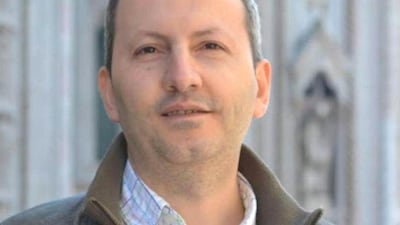Swedish Foreign Minister Ann Linde said on Tuesday she had spoken to her Iranian counterpart to formally object to the planned execution of an Iranian-Swedish professor.
Ms Linde wrote on Twitter that she had been in touch with Iranian Foreign Minister Mohammad Javad Zarif following reports that Iran was preparing to carry out the execution of Ahmadreza Djalali, a specialist in emergency medicine who had been charged with spying.
"Sweden denounces the death penalty and is working to not have the sentence against Djalali carried out," Ms Linde wrote on Twitter.
Djalali, who formerly worked in Stockholm at the Karolinska Institute, a medical university, was arrested during a visit to Iran in April 2016.
In October 2017, he was sentenced to death after being found guilty of passing information about two Iranian nuclear scientists to Israel's Mossad intelligence agency, which led to the scientists' assassinations.
While imprisoned, he was granted Swedish citizenship in February 2018, months after his death sentence was confirmed by Iran's Supreme Court.
Djalali claims he is being punished for refusing to spy for Iran while working in Europe.
His lawyers also claimed they were blocked from presenting submissions before the Supreme Court hearing.
The imprisoned academic has been transferred to solitary confinement in Tehran’s notorious Evin Prison, and his wife indicated that the execution was imminent.
Barbro Elm, a spokeswoman for Sweden's foreign ministry, told AFP they were aware of the reports of the "impending execution of the sentence" and were trying to clarify them.
Djalali's death sentence has been widely condemned by human rights groups and by UN human rights experts, with Amnesty International repeatedly calling for Djalali to be freed.
“It is appalling that despite repeated calls from UN human rights experts to quash Ahmadreza Djalali’s death sentence and release him, the Iranian authorities have instead decided to push for this irreversible injustice. They must immediately halt any plans to execute Ahmadreza Djalali and end their shocking assault on his right to life," Diana Eltahawy, Amnesty's deputy director for the Middle East and North Africa, said in a statement on Tuesday.
"We call on members of the international community to immediately intervene, including through their embassies in Tehran, to save Ahmadreza Djalali's life before it is too late," she added.

